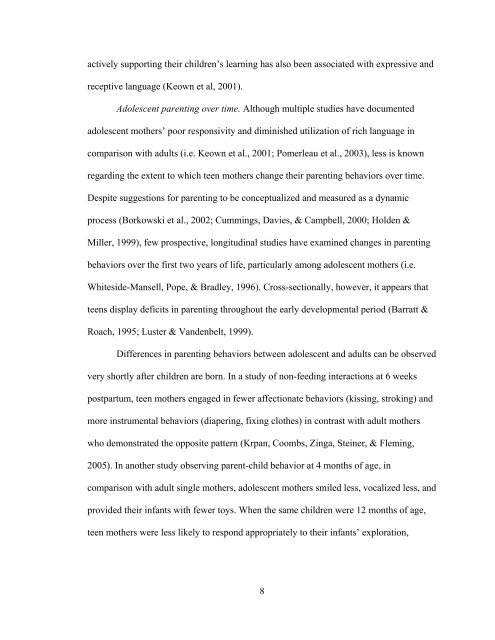DIFFERENCES BETWEEN ADOLESCENT AND ADULT MOTHERS ...
DIFFERENCES BETWEEN ADOLESCENT AND ADULT MOTHERS ...
DIFFERENCES BETWEEN ADOLESCENT AND ADULT MOTHERS ...
Create successful ePaper yourself
Turn your PDF publications into a flip-book with our unique Google optimized e-Paper software.
actively supporting their children’s learning has also been associated with expressive and<br />
receptive language (Keown et al, 2001).<br />
Adolescent parenting over time. Although multiple studies have documented<br />
adolescent mothers’ poor responsivity and diminished utilization of rich language in<br />
comparison with adults (i.e. Keown et al., 2001; Pomerleau et al., 2003), less is known<br />
regarding the extent to which teen mothers change their parenting behaviors over time.<br />
Despite suggestions for parenting to be conceptualized and measured as a dynamic<br />
process (Borkowski et al., 2002; Cummings, Davies, & Campbell, 2000; Holden &<br />
Miller, 1999), few prospective, longitudinal studies have examined changes in parenting<br />
behaviors over the first two years of life, particularly among adolescent mothers (i.e.<br />
Whiteside-Mansell, Pope, & Bradley, 1996). Cross-sectionally, however, it appears that<br />
teens display deficits in parenting throughout the early developmental period (Barratt &<br />
Roach, 1995; Luster & Vandenbelt, 1999).<br />
Differences in parenting behaviors between adolescent and adults can be observed<br />
very shortly after children are born. In a study of non-feeding interactions at 6 weeks<br />
postpartum, teen mothers engaged in fewer affectionate behaviors (kissing, stroking) and<br />
more instrumental behaviors (diapering, fixing clothes) in contrast with adult mothers<br />
who demonstrated the opposite pattern (Krpan, Coombs, Zinga, Steiner, & Fleming,<br />
2005). In another study observing parent-child behavior at 4 months of age, in<br />
comparison with adult single mothers, adolescent mothers smiled less, vocalized less, and<br />
provided their infants with fewer toys. When the same children were 12 months of age,<br />
teen mothers were less likely to respond appropriately to their infants’ exploration,<br />
8
















